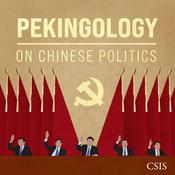29 episodes

Ribbiting Disparities
2025/9/23 | 23 mins.
This podcast explores the notion of income inequality. Although it’s an oft-discussed subject, it’s not always defined well or only discussed in the narrow band of the moral arguments against it. This discussion is meant to go deeper, including examining both the positive and negative aspects of inequality and its role in an economic system. Fundamentally, we’re asking the question as to whether some amount of inequality is a necessary byproduct of capitalism, or perhaps even a desirable outcome of an economic system. Therefore, we hypothesize that there may be an “optimal” amount of inequality in a society.

Frognosis
2025/6/03 | 32 mins.
This episode examines the political debates around public health and public health policy. It is a perfect case study to illustrate so many of the principles covered in earlier podcasts, such as capitalism, externalities, risk, paranoia, and the dumbing down of America.

Trade Wart
2025/2/14 | 29 mins.
Welcome to The Boiling Frog reboot! The first 26 episodes were examinations of general topics, such as understanding capitalism, how social psychology belies the principles of capitalism, and how this all shapes political dialog. The new podcasts will look at specific policies of the new administration and use those as case studies to illustrate the real-life impact of those general concepts.We start with tariffs, a word that Donald Trump loves and is already deploying across multiple sectors and trading partners. The principles we examine go back to two earlier podcasts – our very first one, Laissez Frog, which was about capitalism in general, and our 21st episode, Greenbacks, which was about taxes.

Jimmy Hoppa
2023/4/17 | 37 mins.
This podcast is all about labor unions – why they exist, their history in the U.S., a brief comparison with unions in other countries, the pros and cons of unions, and the larger political implications of their existence.This is a controversial topic in U.S. politics, with many voters (and most elected officials) falling squarely into the “pro-union” or “anti-union” camp. But as with most issues, the truth is much more nuanced and complicated. Labor unions in the U.S. formed – and largely still exist – because of failures in market capitalism. As discussed in our very first podcast, capitalism is based on a number of principles to ensure resources are most efficiently allocated, but in real life those principles are rarely met. This is particularly pronounced in the labor market, which is fraught with friction and often monopsony employers.

Jump for Joy
2023/2/17 | 29 mins.
Building off the prior podcast on learning from the past, this discussion is all about success and failure. We all know the common wisdom that we all learn more from failure than from success, but of course we don’t strive to fail all of the time!
More Government podcasts
Trending Government podcasts
About The Boiling Frog
Listen to The Boiling Frog, Real Problem with Chester Missing and many other podcasts from around the world with the radio.net app

Get the free radio.net app
- Stations and podcasts to bookmark
- Stream via Wi-Fi or Bluetooth
- Supports Carplay & Android Auto
- Many other app features
Get the free radio.net app
- Stations and podcasts to bookmark
- Stream via Wi-Fi or Bluetooth
- Supports Carplay & Android Auto
- Many other app features


The Boiling Frog
download the app,
start listening.




















